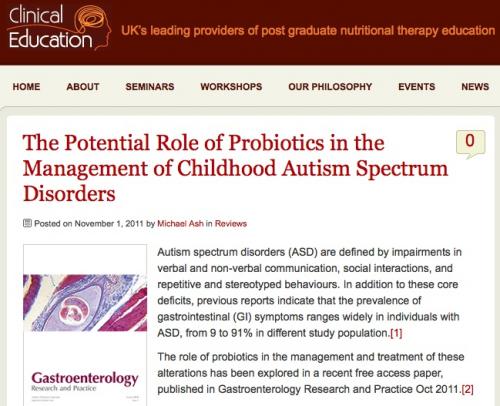For 25 years, Michael Ash ran a very successful integrated health care practice he founded in the west of England. One of the clinic’s specialisms was managing children with autism, and in that time Mike treated over 350 children and adults diagnosed with autism. In 2007, Mike sold his interest in the clinic to concentrate on nutrition research, lecturing and developing Nutri-Link, one of the leading practitioner supply companies in the UK (also a long-time supporter of ANH-Intl). He personally writes most of the articles and reviews for NL Education and has pioneered the introduction of functional medicine training of practitioners in the UK.

Michael Ash BSc(Hons) DO ND FDipION MIoD. Osteopath, Naturopath, Nutritional Therapist and Managing Director of Nutri-Link
How did your interest in treating children with autism first start?
In 1996 I was asked to do a presentation for a colleague on the gastrointestinal abnormalities identified with subsets of people, one of which was autism. I didn’t know much about autism then but I have a long history of being involved in researching the mucosal immune system and the bacteria that populate our gut. So I gave this presentation and within the audience was a father of a child with autism who ran a magazine. Over a number of weeks he persuaded me to write up my presentation as a proposed mechanism of dysfunction; the relationship between all the bacterial composition, the stimulation of key pattern receptors in the mucosal system in the gut and subsequently a translation of symptoms. He published it in his magazine, the Autism File, and I had phone calls from about 70 parents within a week. I went very quickly from someone who was proposing a hypothetical explanation as to why people experienced changes in their behaviour, to suddenly being given the chance to take a group of people who felt what I had said resonated with them, and we began to explore my hypothesis and look at intervention.
How common is an autistic diagnosis?
I started practicing back in 1982 and in those days 1 in 15000 children were given a diagnosis of autism. And I think last year official figures put it at approximately 1 in 100 on average, with boys being more affected than girls. Inevitably there will have been an improvement in diagnosis, and there has been a broadening of the diagnostic framework but it’s impossible to account for that change in numbers entirely through changes in diagnostic evaluation.
Autism appears to be a very complex area, a hotbed of controversy and a subject that ignites extreme emotion. Can you cut through some of the emotion and define what autism is for our readers?
Autism is a constellation of different symptoms. It’s what makes diagnosis a process rather than a definitive line; you cant just have a blood test or a single question for acquired autism. Part of the problem is that it has many, many different subsets within its framework. Professor Jeremy Nicholson from Imperial College London once described it as “a mosaic disease” as it has so many facets, but commonly (and that means at least over 50%) the people that have been given the diagnosis will have some form of gastro-intestinal upset. Along with this there are behavioural changes as well.
Does the fact that it is so complex make it difficult to diagnose?
Autism is pretty well defined in terms of its behavioural presentation. Most psychologists and psychiatrists have a series of questions that primarily relate to changes in that person’s behaviour. Most people gather their diagnosis over time by collating a series of experiences that they observe with their children when they are between the ages of 18 months to 3 or 4 years.
Diagnosing in terms of the behavioural symptoms must have its difficulties?
There’s been a lot of work over the years trying to grade people within their framework from profound autism to mild to moderate behavioural changes that perhaps touch upon that framework. It’s never been my role to make that diagnosis — my role was always to meet people that had already been given a diagnosis, or have identified traits in their children and are keen to avoid the diagnosis and subsequent 'labelling'.
Could you discuss some of your treatment approaches and talk about why they've been so successful?
Where I felt most comfortable was where my expertise lay which was looking for immune disturbances that could have a strong correlation to alterations in the mucosal immune system of the gut. We make more immune decisions in our gastrointestinal tract in a day than the rest of our body’s immune system makes in a lifetime. In our most formative years and especially in the first 1000 days we are busy trying to create a ‘team’ to share this space, but lots of things try to damage that. Among the most disruptive influences are, in terms of medicine, the use of antibiotics, while in terms of lifestyle behaviour, it's food choices that have the greatest influence. Many of the children I would see had already made very unique and obscure self-selections of foods.
Studies that came out in the late 1990’s looked at the role of casein and gluten, not solely as antigenic components that might produce an immune response but as components that in some individuals may produce an opioid-like effect. Many parents would describe that they could see a difference in their children’s behaviour when they consumed a certain food but it wouldn’t necessarily be because of an obvious immunoglobulin response, but it may be because of a tendency towards addictive behaviour for a preferred food because it made them feel different.
We would try to remove any foods that we felt were provocative, and identify through stool analysis and organic probes if there was the presence of a pathogenic organism in the gut.
Milk and wheat derived products have the greatest correlation, others such as sugars and salicylate a are also recognised to be more problematic than benign. Most vegetables, brown rice, meat and fish represent tolerable foods. However, any food may be beneficial or benign for one person and problematic for another. A good food diary and observation is the primary place to start.
Are there any specific markers that can be tested for?
There are many areas that one tries to look at. However, there is one simple marker to measure; secretory immunoglobulin A (sIgA). An early paper that measured immune markers in autistic children, recognised that there was a tendency towards both immunoglobulin A (IgA) and sIgA deficiency. Secretory IgA is very important as it acts as a mediator between the immune system and our commensal (gut) bacteria by coating our bacteria with a protein that allows our immune system to be benignly interested in them but not see them as being hostile. It ensures the correct presentation of these organisms to our immune system, helps to wash away pathogens and also helps to facilitate the digestion of carbohydrates by enzymes. It’s the only non-inflammatory immunoglobulin that our body produces and has many functions. Looking at each function independently, you may think it unnecessary, but combined, they mean that sIgA plays a very valid part in the restoration of a person's capacity to cope with life and maintain the vital aspect of immune tolerance.
Many people are now very familiar with Andrew Wakefield and his suggestion that there is a link between vaccines and severe disturbance in the gut microflora. What’s your view on this?
When his first paper came out in the Lancet journal back in 1998, there were a lot of parents who felt that their findings had been validated. Vaccinations have provided far more gains than losses in terms of infectious diseases, but if people want to know whether they are completely risk-free, the answer is no. Another question asked is whether vulnerable people, i.e. those with sensitised immune systems, who receive a challenge are more likely to have a change in behaviour as a result? I personally think there is a subset of children for whom that trigger can be very valid. Is that subset enormous? I think probably not. There have been some subsequent studies that appear to provide some weight to Dr Wakefield's description of the unique pathology of the gut in people with autism and I think what he did get right was that gastrointestinal inflammation and systemic consequences are more common in individuals with autism.

Gastroenterologist Andrew Wakefield: one of the first to flag a relationship between gut dysfunction and autism
Do you have any suggestions for what dietary or other simple changes parents of autistic children could try at home?
I have tried to find some very simple and, where possible, cheap, and of course safe solutions over the years because there is a myriad of things that are suggested to parents, a lot of which are very expensive. My simple strategy is:
- Look at the diet of your child and yourselves. If you are consuming wheat or other grains that contain a lot of gluten and you feel you could have a trial period without that being consumed, then try a 100% gluten-free diet for at least 8 weeks. The same recommendation would go for dairy products. This can be very challenging for some parents as they may not realise how much gluten and diary they are actually consuming. It’ll take some time and preparation to get it right. What it won't cost is money – it costs nothing to exclude something except time, energy and planning.
- Vitamin A and Omega 3 fatty acids are found in natural cod liver oil and have been shown in a number of human studies to benefit both visual function in children with autism, and immune function. So I always used to suggest a teaspoon a day of natural cod liver oil that contains the natural ‘cis’ form of vitamin A [Ed. as opposed to the less effective all-‘trans’ found in most vitamin A supplements].
- I wrote a paper with a number of immunologists looking at the evidence over the last few years about why probiotics might be able to help children with autism. A non-lactose producing probiotic for the small intestine and a bifido species for the large intestine, both of which favour an anti-inflammatory response, have been shown clinically to provide reasonably consistent results in improving functionality.
- Use a yeast called Saccharomyces boulardii that has shown in many studies to produce an increase in sIgA. You only need very small quantities in young children.
So — summarising — a well-chosen probiotic, together with food exclusion, Saccharomyces boulardii, and vitamin A/omega 3 fatty acid supplementation are quite cheap, safe and effective ways to support your child’s immune function.
Snapshot of one of the many fascinating articles on the NutriLink Clinical Education website
Are there any other areas of support you could suggest that parents may not be aware of?
A lot of families find a great deal of help in getting together with other parents, and schools these days are much more understanding of these needs. Behavioural training, of which there are many very different protocols on offer, can also be extremely helpful. People with autism often feel very disorientated, so training patterns and routines that can be learned can be very supportive. I don’t want to in any way suggest that nutrition is the only route to take, as that’s just not the case. Some people also try cranial osteopathy or structured educational programmes and many other strategies. I think most parents will find what works for them and their child through friends, peers and parental instinct. There’s also the Internet that can on one hand be a dangerous environment if used irresponsibly and indiscriminately. But, on the other hand, it can also provide a lot of valuable information that can help improve behavioural support within the family – as well as providing a comforting and supportive environment. Numerous web sites now provide access to papers, but it can be difficult to stand back and objectively assess them if it is your child or yourself that you are seeking ideas about.
How much support can parents be expected to get from their primary healthcare provider or general practitioner?
Its very tough thing to firstly learn that your child has been diagnosed with autistic traits, and then to begin to think about how you're going to manage this — both emotionally and financially. Some parents thrive and become empowered and others get overwhelmed. Professional support is essential. Your local health care providers may not be perfect, they may not be everything that you need them to be and they may disagree with some of the theories that you turn up with, but you absolutely need them on board as they open the door to all sorts of additional support. As our society starts coming to terms with the scale of the autism epidemic, these support systems are becoming better developed all the time.
What sort of comfort can you give the ‘overwhelmed’?
In clinic what we used to do was focus people on one thing at a time. We had a strategy, we’d work our way through it; we always had flexibility but we had a clear beginning and a clear end. How we got there was guided by evidence that was collected from lab work and samples, as well as experientially – how the child, the adult or other family members responded.
It must be very emotional for you as well seeing a child’s quality of life and capabilities improve in front of your eyes?
I’ve been fortunate enough to be involved with over 350 individuals who were diagnosed with autism. Most GPs might see 15 or 20 during their practice life. I’d say it’s the most remarkable emotional rollercoaster. I’ve certainly cried many times! I watched many disasters be recovered, and many successes fall away. There’s not always an apparent explanation for either.
It’s a shared battle for everybody; nobody can do this on their own. You’ve got to become an expert in your own life and that of your children, and that asks a great deal of many people. But you shouldn’t ever feel like you can’t do it!
Is there anything else you’d like to add?
Well, if we can finish on a positive note – I’ve watched many children come out of their Autistic Spectrum Diagnosis. I watched a lot of them come out and stay out. I’ve also watched some come out and go back in again. I’ve watched many whose lives and quality of life has improved significantly even though they may remain within the autistic spectrum. But those phone calls to say that a child has won an award, or has gone to mainstream school are the landmarks that mean that that individual’s future is very different from when we first met them. And that’s what made me get stuck in again day after day!
Further information:
Autism File website and magazine
Give Autism a Chance campaign video









Comments
your voice counts
04 October 2012 at 2:21 am
For further reading I would like to recommend
Autism: Beyond Despair by Tinus Smits. An excerpt can be found here
http://www.narayana-publishers.com/homeopathy/pdf/Autism-Beyond-Despair-Tinus-Smits.07849_2Case.pdf
Michael Ash did not mention the link between vitamin D deficiency and autism.
http://www.lef.org/magazine/mag2009/apr2009_The-Link-Between-Autism-and-Low-Levels-of-Vitamin-D_01.htm
The vitamin D theory even provides an explanation of autism's gender discrimination.
To supplement with vitamin D is very cheap.
Unfortunatly vitamin A counteracts vitamin D activation. So, is it advisable to supplement with retinoic acid ( vitamin A ) alongside vitamin D? Dr. Cannell thinks it isn't
http://www.drcranton.com/nutrition/Vitamin_D_autism.htm
05 October 2012 at 3:30 pm
Most vitamin D experts will now say simply that you shouldn't take them at the same time. If the vitamin A and cod liver oil is taken in the morning, the vit D supplement (assuming there is no adequate sunshine) can be given at night.
Your voice counts
We welcome your comments and are very interested in your point of view, but we ask that you keep them relevant to the article, that they be civil and without commercial links. All comments are moderated prior to being published. We reserve the right to edit or not publish comments that we consider abusive or offensive.
There is extra content here from a third party provider. You will be unable to see this content unless you agree to allow Content Cookies. Cookie Preferences